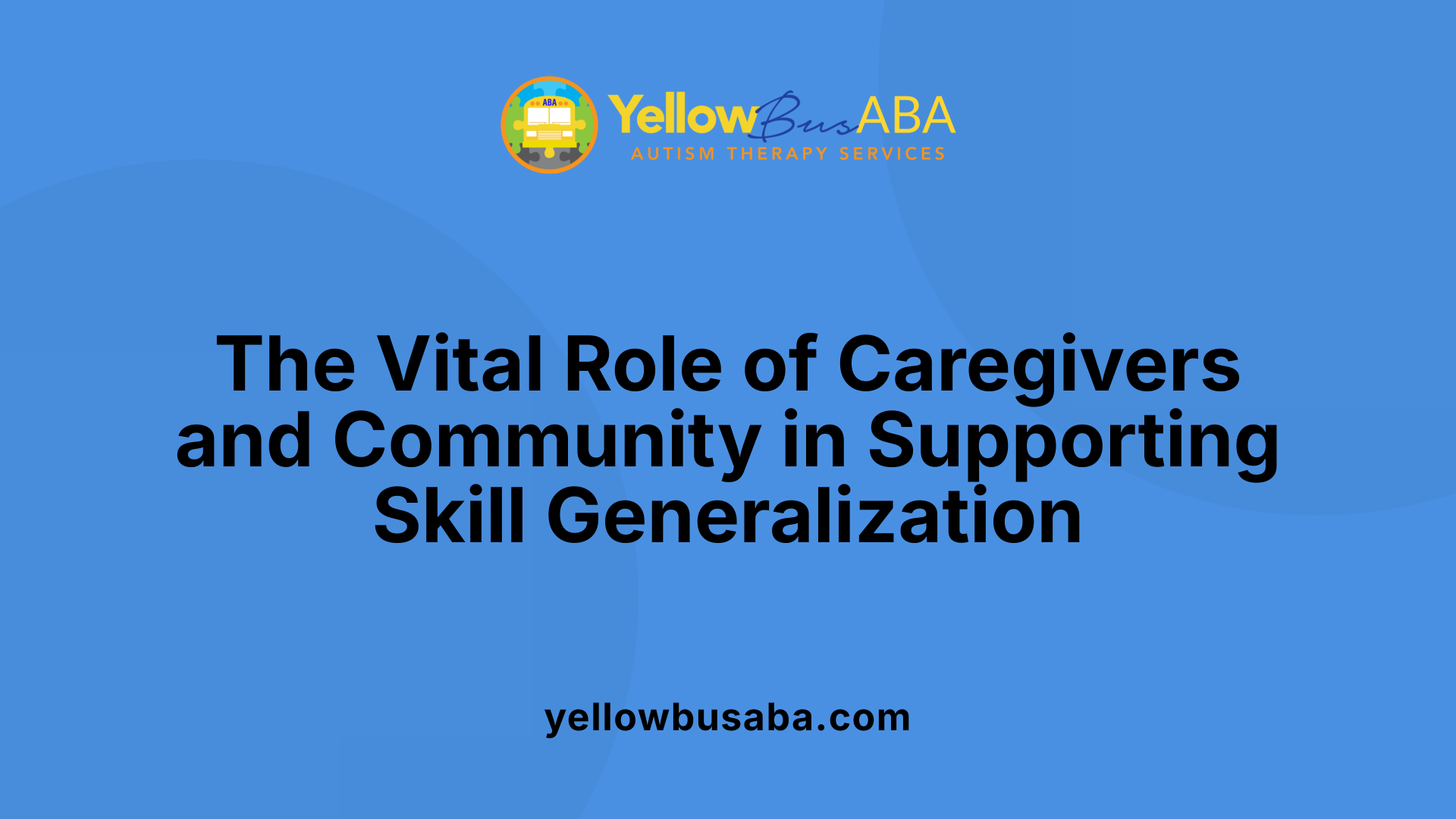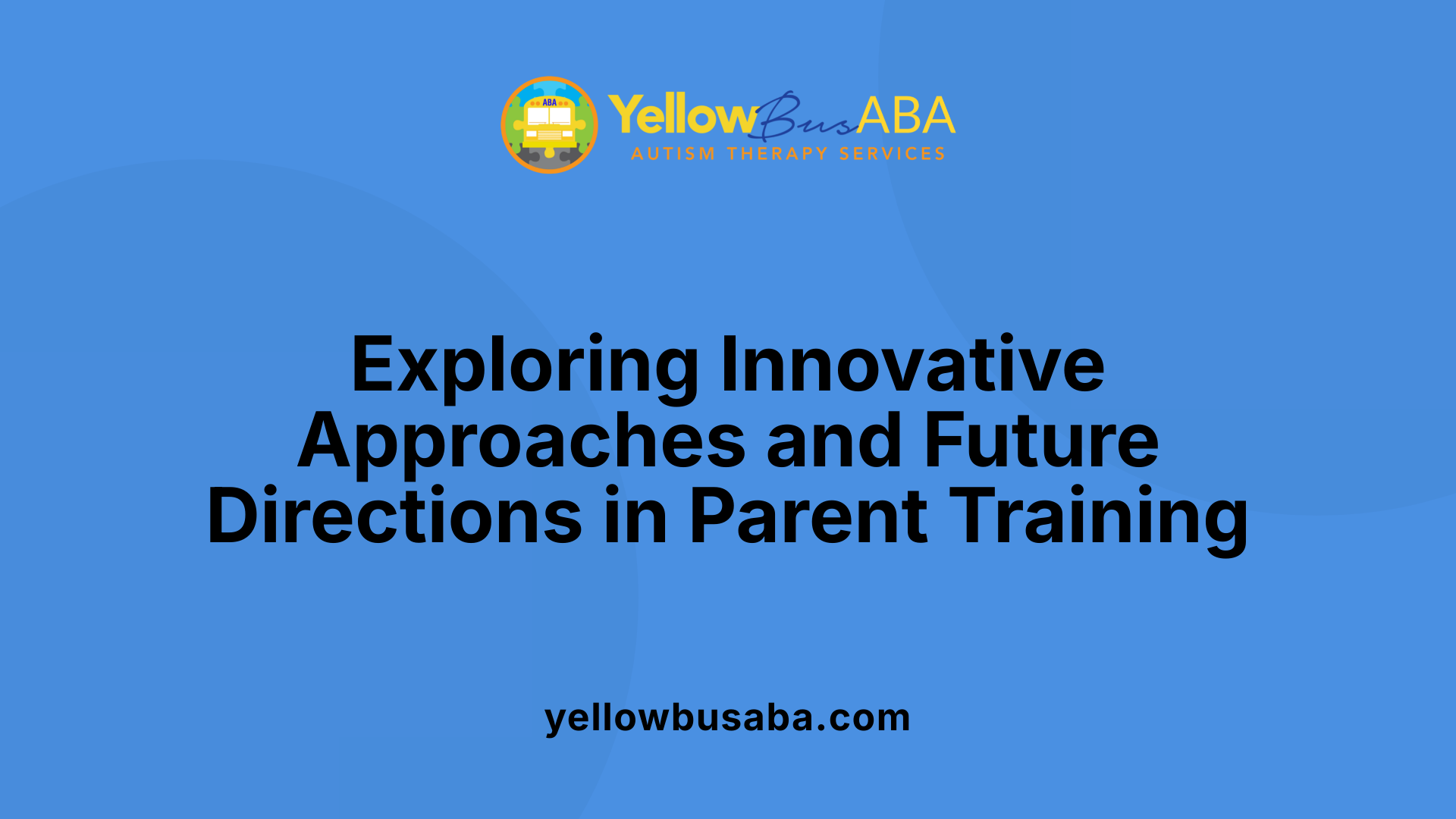Understanding the Significance of Skill Generalization
Skill generalization is a cornerstone of effective developmental support, especially for children with autism spectrum disorder (ASD). It involves the transfer of learned behaviors across diverse settings, such as home, school, and community environments. Facilitating this transfer is crucial for promoting independence, social engagement, and overall quality of life. Parent training emerges as a pivotal strategy in ensuring that skills acquired during therapy are maintained and applied effectively outside clinical settings.
Defining Skill Generalization and Its Importance
What is the importance of parent training in facilitating skill generalization across various environments?
Parent training plays a vital role in helping children with autism spectrum disorder (ASD) transfer skills learned in therapy to everyday settings like home, school, and community. When parents are trained in ABA techniques such as reinforcement, prompting, and naturalistic teaching strategies, they can consistently implement these methods outside of formal therapy sessions.
This consistency is crucial for children to apply and maintain their skills in real-world situations. Regular reinforcement at home encourages children to use communication, social, and self-help skills across different environments, promoting greater independence.
Involving parents also strengthens collaboration between families and therapists. It allows for tailored strategies that specifically address individual child's needs, ensuring more effective generalization.
Training parents equips them with the tools to practice skills actively, preventing regressions and supporting ongoing development. Ultimately, empowered parents can create stable, supportive routines that foster skill retention, boost confidence, and foster long-term success.
Creating an environment where skills learned are consistently reinforced across settings significantly enhances a child's social interactions, independence, and overall quality of life.
Role of ABA and Naturalistic Teaching Strategies
The importance of ABA in teaching skills that generalize.
Applied Behavior Analysis (ABA) is a highly effective approach for teaching children with autism spectrum disorder (ASD) skills that can transfer across different settings. One of ABA’s core goals is to ensure that learned behaviors are not limited to the therapy environment but are applicable in real-world situations.
ABA interventions promote generalization through teaching in various environments, using diverse stimuli, and involving multiple people. For example, children might learn communication skills during therapy sessions, at home with caregivers, and in community settings like school or parks.
Another crucial aspect is gradually fading prompts and cues, encouraging children to perform skills independently. This process helps children adapt their abilities across multiple contexts, supporting long-term success and independence.
Use of naturalistic teaching methods such as role-playing, diverse materials, and involving multiple individuals.
Naturalistic teaching strategies complement ABA principles by creating engaging, real-life learning opportunities. Techniques such as role-playing allow children to practice skills in scenarios that mimic everyday interactions, thereby fostering natural response patterns.
In addition, using varied materials—like different toys, books, or social scenarios—and involving different people, such as peers, teachers, or family members, promotes stimulus and response generalization. This variety helps children respond appropriately to different cues and settings.
Activities are often embedded into daily routines to make learning relevant and meaningful. These naturalistic approaches encourage children to apply their skills across a wide range of situations, enhancing the durability of their learned behaviors.
Research supports that combining ABA with naturalistic teaching strategies leads to broader skills transfer. It can mitigate common challenges like stimulus overselectivity or restricted context learning, ensuring that children with ASD are better prepared for the complexities of daily life.
Parent training's role in promoting generalization
Parents are essential partners in this process. Effective parent training programs teach caregivers how to implement ABA strategies at home, reinforcing skills learned during therapy sessions.
By involving parents through methods such as Behavior Skills Training (BST), caregivers learn to use visual aids, positive reinforcement, and consistent routines. This active participation ensures that skill development continues outside formal settings.
Studies show that when parents are trained adequately, children exhibit more consistent behavior improvements, and skills generalize more effectively across environments. Furthermore, tools like homework calendars help parents plan and document practice sessions, bolstering ongoing learning.
Barriers and strategies for better generalization
Despite the benefits, certain barriers can impede generalization. Stimulus overselectivity, limited teaching contexts, and insufficient caregiver involvement are common challenges.
Targeted strategies, such as diversifying teaching stimuli, involving multiple social partners, and conducting systematic assessments, help overcome these obstacles. Caregiver participation stands out as particularly vital in extending learning from therapy to everyday life.
In conclusion, integrating ABA with naturalistic teaching strategies, supported by active caregiver involvement and explicit planning, enhances the transfer of skills across different settings. This comprehensive approach ultimately improves the social and functional independence of children with ASD, enriching their overall quality of life.
| Aspect | Description | Examples |
|---|---|---|
| Teaching environments | Multiple, varied settings to promote transfer | Home, school, community |
| Teaching methods | Naturalistic, engaging activities | Role-playing, real-life routines |
| Involvement | Multiple people to act as social models | Family members, teachers, peers |
| Tools | Visual aids, homework, reinforcement | Visual schedules, reward charts |
| Barriers | Challenges impeding generalization | Stimulus overselectivity, limited context |
| Strategies | Approaches to overcome barriers | Diversify stimuli, coach caregivers |
Research consistently highlights that deliberate, planned efforts focusing on generalization are vital. Employing these strategies can significantly enhance the ability of children with ASD to apply learned skills independently across diverse settings.
Strategies Used in Parent Training for Skill Transfer

What strategies and methods are used in parent training to promote generalization of skills?
Parent training plays a vital role in helping children with developmental disorders, particularly autism spectrum disorder (ASD), transfer learned skills across different environments. One of the main approaches is teaching parents to implement consistent routines, which provide predictability and structure that support skill practice in natural settings.
Behavioral Skills Training (BST) is a popular method used within parent training programs. BST includes three core components: modeling, role-playing, and rehearsal. Parents observe demonstrations (modeling) of desired intervention techniques such as discrete trial training, then practice these methods through role-playing exercises until they can perform them accurately. This hands-on practice builds confidence and competence.
Reinforcement strategies are also emphasized. Parents are trained to identify effective reinforcers tailored to their child's preferences, which motivate the child to use and maintain targeted behaviors. Additionally, teaching parents to vary stimuli, use prompts strategically, and provide opportunities for practice in different settings enhances the likelihood of skill transfer.
Visual aids such as picture schedules, visual prompts, and visual reinforcement charts are practical tools that assist children and parents in understanding routines and expectations. These aids make the learning process clearer and support generalization by providing consistent visual cues across environments.
Ongoing guidance from therapists, combined with regular data collection at home, enables parents to monitor progress, troubleshoot challenges, and adapt strategies as needed. This continuous feedback loop reinforces skill retention and fosters independence.
By involving parents actively in intervention plans, ABA programs help create a consistent environment where children can practice skills repeatedly across contexts such as home, school, and community. This deliberate and structured approach to parent training ultimately increases the likelihood that learned behaviors will transfer effectively, leading to improved social, communication, and daily living skills. In summary, the combination of routine implementation, modeling, role-playing, visual aids, and ongoing support forms the foundation of successful parent-led skill generalization efforts.
Evidence Supporting Parent Training Effectiveness
Research consistently demonstrates that parent training plays a significant role in promoting the generalization of skills among children with developmental disabilities, including those with autism spectrum disorder (ASD). Studies show that when parents are trained using behavioral strategies, they can effectively implement these techniques across various settings, such as at home, in school, and within community environments.
One of the primary indicators of success is the increase in children's correct responses and behavior maintenance over time. For example, interventions like Applied Behavior Analysis (ABA) training have shown that parents who learned to utilize discrete trial training and other behavioral methods could reliably apply these skills in everyday situations. This consistency is essential for preventing regression and ensuring that skills are transferred effectively outside the therapeutic setting.
Research findings highlight that parent training not only enhances children’s skill acquisition but also fosters broader behavioral improvements. For instance, successful programs involve teaching parents to use visual aids, role-playing, and naturalistic teaching strategies that mirror real-life contexts. These approaches help children respond appropriately across different social and environmental circumstances.
Studies of specific parent-focused interventions, such as Pivotal Response Treatment and DIR/Floortime, have shown small to moderate positive effects on skill generalization. Importantly, behavioral skills training for parents boosts their confidence and competence, enabling them to reinforce learned behaviors consistently, which is crucial for maintaining skills in the long term.
Furthermore, research indicates that parent training can lead to improvements in parental interactions and overall family dynamics, supporting sustainable behavioral change. One notable study also explored the effects of parent training following Behavioral Skills Training (BST), revealing that both parent and child behaviors improved significantly. These gains were maintained after follow-up, demonstrating the lasting impact of well-structured parent training programs.
In addition to direct benefits for children, parent training supports the integration of learned skills into broader contexts, such as school and community, thereby enhancing social engagement and independence. Overall, the evidence underscores that empowering parents through targeted training is crucial for achieving widespread, durable, and meaningful improvements in children with ASD.
Supporting Children to Transfer Skills Across Settings
How are parents taught to support their children's ability to transfer skills to different settings?
Parents play a crucial role in helping children generalize skills acquired through therapy to real-world environments like home, school, and community. To equip caregivers with the necessary tools, structured training programs are implemented, combining workshops, coaching, and instructional materials.
These programs focus on teaching parents how to create environments conducive to skill transfer. They learn to utilize visual supports, such as picture schedules and social stories, which aid in cueing and reinforcing targeted behaviors across various settings. Naturalistic teaching strategies, including role-playing, community outings, and embedded teaching during daily routines, are emphasized to foster organic skill application.
Parents are guided on how to recognize opportunities for generalization, such as applying communication skills during conversations with different people or during different activities. They are also taught to break complex skills into smaller, manageable steps, making it easier for children to practice and master in diverse situations.
An important aspect of training involves maintaining consistency. Parents learn to reinforce skills using similar prompts and reinforcement across settings, which helps children understand that the skills are universally applicable.
Collaboration with therapists is encouraged so that parents can implement strategies confidently and consistently. Training sessions often include role-playing exercises, where parents practice responding to common scenarios, and instruction on how to gradually increase activity complexity.
Overall, parent education aims to empower caregivers to actively facilitate the transfer of skills, ensuring that children develop independence and social competence across different environments. This comprehensive approach promotes long-term success and improves overall quality of life for children with ASD.
Impact of Parent Training on Developmental Outcomes
What impact does parent training have on developmental outcomes for children with autism or other developmental disabilities?
Parent training plays a vital role in improving outcomes for children with autism spectrum disorder (ASD) and other developmental challenges. When parents are equipped with targeted strategies and supported through systematic training, they become active partners in fostering their child's development.
One of the most notable effects is the enhancement of communication skills. Parents learn to implement specific teaching methods, like discrete trial training, at home, which reinforces the child's ability to communicate effectively. This active involvement promotes greater social engagement, helping children respond more appropriately to social cues and interact more confidently with others.
In addition, parent training supports increased independence in children. By applying strategies learned during training, parents encourage their children to perform daily tasks with less assistance, fostering autonomy. The training also helps reduce problematic behaviors such as tantrums, self-injury, or aggression, creating a more positive and supportive environment for growth.
Furthermore, parent-mediated interventions can decrease parental stress and improve overall family functioning. When caregivers feel competent and supported, they experience less frustration and gain confidence in managing their child's behaviors.
Research consistently shows that behavioral parent training, including programs like Parent-Child Interaction Therapy (PCIT) and Positive Parenting Program (Triple P), leads to notable gains. These interventions not only improve the child's developmental milestones but also bolster parental self-efficacy.
Evidence indicates that engaging parents through culturally adapted and ongoing support programs enhances the long-term benefits, ensuring that skills gained are maintained and generalized across many settings.
| Outcome Area | Improvements Observed | Supporting Strategies |
|---|---|---|
| Communication | Increased verbal and non-verbal skills | Modeling, reinforcement, visual aids |
| Social Skills | Better interaction with peers and adults | Role-playing, naturalistic teaching |
| Independence | Tasks completed with less parental help | Fading prompts, daily routines |
| Behavior | Reduction in challenging behaviors | Clear expectations, consistent responses |
| Family Dynamics | Reduced stress, stronger relationships | Collaborative planning, caregiver support |
Ultimately, high-quality parent training is essential for fostering meaningful development and support for children with ASD. By involving parents actively and systematically, families can ensure skills are transferred across settings, resulting in improved quality of life for children and their families.
Addressing Barriers and Enhancing Generalization Efforts
What are common barriers to generalization, and how can they be addressed?
Several obstacles can hinder the effective transfer of learned skills to everyday settings, which are crucial for meaningful development in children with ASD. Recognizing these barriers is the first step toward implementing targeted strategies that foster better generalization.
One prevalent issue is stimulus overselectivity, where children respond only to specific cues rather than broader stimuli. This focus can limit applying skills in varied environments. To combat this, therapists can vary the stimuli used during teaching sessions, ensuring children are exposed to multiple cues that resemble real-world settings.
Restricted contexts pose another challenge. When teaching occurs in highly controlled or artificial environments, children may struggle to transfer skills to naturalistic settings like home or community areas. Incorporating naturalistic teaching methods, such as play and community-based activities, helps bridge this gap.
A lack of naturalistic teaching and limited caregiver involvement also impact generalization. When teaching is confined to clinical or structured settings, children do not experience the full range of social and environmental cues. Engaging caregivers through training and collaboration encourages reinforcement and practice outside therapy sessions, making skills more adaptable.
Furthermore, insufficient assessment of generalization reduces the ability to track progress and plan further intervention. Regular, systematic evaluation of how skills transfer to new settings helps identify areas needing additional support or modification.
Targeted strategies can effectively address these barriers. These include
- Varying teaching materials and stimuli to prevent overselectivity,
- Incorporating community and natural settings into teaching,
- Training caregivers and educators to implement consistent reinforcement strategies,
- Using assessment tools to monitor and adjust approaches as needed.
Creating an environment that promotes naturalistic and flexible learning experiences ensures skills are meaningful and retained across different contexts, ultimately leading to more functional and independent behaviors for children with ASD.
Types of Generalization in ABA and Their Significance

What are the different types of generalization in ABA, and why are they important?
In applied behavior analysis (ABA), understanding various forms of generalization is essential for ensuring that learned skills are functional and lasting in real-world settings. There are primarily three types of generalization: stimulus generalization, response generalization, and maintenance.
Stimulus generalization occurs when a child responds similarly to different but similar stimuli. For instance, if a child learns to say "hello" when greeted by a teacher, stimulus generalization would involve greeting other people in different environments, such as friends or family, with the same behavior. This promotes appropriate social interactions across varied situations.
Response generalization involves using related, but not identical, behaviors to achieve a goal. For example, a child who learns to say "thank you" might also begin to use gestures like a nod or smile to express gratitude. This flexibility allows children to adapt their behaviors in diverse contexts, increasing functional communication.
Maintenance refers to the continued use of skills over time, even after formal training ends. It emphasizes the importance of teaching skills in a way that ensures their persistence in daily life. With effective maintenance, children can retain and utilize skills consistently in various environments, enhancing independence.
Achieving all three types of generalization amplifies the effectiveness of ABA interventions. It ensures children can apply skills across settings such as home, school, and community, fostering social engagement and functional independence.
Schools, caregivers, and therapists all play roles in facilitating these forms of generalization by diversifying teaching environments, materials, and social partners. Explicit instruction and ongoing reinforcement help bridge the gap between learning and real-world application, leading to more meaningful and lasting behavioral improvements.
Promoting Independence Through Skill Generalization
How does skill generalization contribute to independence and social engagement?
Effective skill generalization is essential for helping children, especially those with autism spectrum disorder (ASD), develop independence and improve their social interactions. When children are able to transfer skills learned in therapy to various settings—home, school, community—they become more autonomous in daily life. For instance, if a child learns how to initiate conversation during therapy, but can also use this skill across different social environments, they are more likely to build meaningful relationships.
Generalization ensures these skills are not confined to controlled settings but are applicable in real-world situations. This broad application builds confidence and self-reliance, empowering children to handle routines, manage social cues, and respond appropriately without constant supervision. As they become more self-sufficient, their social engagement also improves—allowing them to participate actively with peers and community members.
The capacity to apply communication, self-care, and social skills across diverse contexts vastly enhances long-term outcomes. These adaptive abilities support ongoing participation in community activities, educational opportunities, and eventually, employment. Ultimately, successful skill transfer fosters a sense of independence that boosts overall quality of life, making social inclusion and self-reliance attainable milestones for children with ASD.
How does this relate to long-term success and quality of life?
Promoting skill generalization has enduring benefits, laying the groundwork for sustained personal and social development. When children can apply their skills consistently over time and across settings, they are more likely to achieve long-term success. This success isn't just academic or behavioral; it also encompasses emotional well-being and social satisfaction.
Research highlights that children who effectively generalize skills tend to maintain positive behaviors and continue to develop new ones, even after interventions end. Caregiver involvement and deliberate practice are crucial in ensuring these skills persist and expand over the years.
By fostering independence and facilitating social engagement, skill generalization supports a more inclusive, capable, and confident community of individuals with ASD. These outcomes contribute significantly to an improved quality of life, enabling them to participate fully in everyday activities, form relationships, and pursue personal goals. The overall effect is a life characterized by greater autonomy, happiness, and societal participation.
| Aspect | Impact | Additional Details |
|---|---|---|
| Independence | Promotes self-reliance in daily routines | Transfer of skills like self-care and communication across environments |
| Social Engagement | Enhances ability to interact with diverse individuals | Application of social skills beyond structured settings |
| Long-term Success | Sustains behavior change over time | Fosters adaptive skills that support community involvement |
| Quality of Life | Increases overall well-being | Better inclusion, participation, and personal satisfaction |
Research and practical evidence both underline the significance of deliberate, caregiver-supported strategies in fostering effective generalization, ultimately leading to more independent and socially engaged individuals.
Creating Supportive Environments for Generalization

What environmental factors are important to consider when promoting generalization?
When promoting the transfer of skills across different settings, several environmental factors play a crucial role. These include the similarity between environments, the sensory aspects of each setting, and the level of distractions present.
Creating an environment that resembles the natural setting where the child will eventually use the skill helps facilitate effective generalization. For example, practicing communication skills at home, in school, and in community locations ensures the child can adapt skills across different contexts.
Sensory factors such as lighting, noise levels, and tactile stimuli should be tailored to meet the child's needs, minimizing overwhelming stimuli that could hinder learning. Adjusting sensory inputs makes the environment more manageable and encourages successful skill use.
Distraction levels are also important. Reducing unnecessary distractions helps children focus on the target skills and encourages consistent application across diverse settings.
Availability of reinforcement in each environment sustains motivation and promotes skill retention. Caregivers and teachers can reinforce appropriate behaviors regularly, ensuring that positive behaviors are strengthened.
To support generalization, environmental modifications should be made collaboratively. Engaging caregivers, teachers, and community members in understanding how to replicate supportive conditions ensures consistency.
Naturalistic teaching settings, such as the child's classroom, home, or community spaces, are especially valuable. These settings provide authentic contexts for practicing skills, increasing the likelihood that learned behaviors will transfer and last over time.
Effective generalization depends on these environmental considerations. Careful planning and collaboration lead to tailored environments that improve learning outcomes and help children apply skills more broadly, fostering independence and social integration.
Role of Caregivers and Community in Supporting Generalization

How can caregivers and community members support skill transfer across environments?
Caregivers and community members play a pivotal role in helping children with autism spectrum disorder (ASD) apply their skills in various settings. Effective support begins with active participation in training sessions where they learn strategies such as role-playing, visual aids, and consistent reinforcement techniques. This active involvement enables them to recognize opportunities for naturalistic practice during daily routines and interactions.
Incorporating community outings, like visits to parks, stores, or social gatherings, is essential for providing real-world contexts for skill application. These outings create opportunities for children to generalize communication and social skills beyond structured therapy sessions. Caregivers are encouraged to use visual supports and prompts to guide children during these experiences, ensuring that learned behaviors are reinforced across different environments.
Building strong collaborative relationships with teachers and other community providers further supports ongoing development. When everyone involved understands and implements consistent strategies, children benefit from a cohesive support system. This collaboration helps reduce inconsistencies that can hinder generalization.
Additionally, caregivers can foster independence by guiding children through their day, offering praise for successful social interactions, and gradually reducing prompts to promote autonomous use of skills. Such deliberate practice, combined with consistent reinforcement across settings, ensures that learned skills are effectively transferred and maintained.
In conclusion, active caregiver and community involvement—through training, naturalistic learning opportunities, outings, and collaboration—is fundamental for facilitating meaningful skill transfer. This comprehensive approach enhances social participation, promotes independence, and ultimately improves the child's quality of life.
Innovative Approaches and Future Directions in Parent Training

What are some innovative approaches to enhancing parent training for skill generalization?
Recent advances in parent training methods have introduced several innovative strategies to improve skill generalization for children with ASD. Technology plays a pivotal role, with telehealth coaching allowing parents to receive real-time guidance from clinicians remotely. Mobile applications and online modules also provide accessible, flexible, and tailored training options that fit various family schedules and learning preferences.
In addition, tailored interventions are increasingly being designed to consider each child's unique challenges, cultural background, and family circumstances, making skill development more personalized and effective. Naturalistic teaching strategies have evolved further by integrating environmental modifications that promote skill transfer in everyday settings.
Emerging tools like video modeling, virtual reality experiences, and gamified training programs engage parents actively and enhance learning outcomes. These methods increase motivation and improve retention of strategies.
Ongoing research continues to explore how these technological and tailored approaches can foster consistent skill practice across different environments. The goal is to build robust generalization that supports long-term development benefits, independence, and social participation for children with ASD.
Conclusion: The Critical Role of Parent Training in Lifelong Development
Summarizing the Importance of Skill Generalization
Effective generalization of skills across various settings is crucial for children with autism spectrum disorder (ASD). It enables them to apply what they learn in therapy to real-world environments like home, school, and community. Strategies such as teaching in multiple locations, using a variety of materials, and involving different people help kids adapt their skills across different social and environmental contexts.
Research shows that intentional, explicit instruction is necessary for successful generalization, countering misconceptions that skills transfer automatically. Active caregiver participation is vital; parents and other adults involved in a child's life can reinforce skills learned in therapy, ensuring consistency and promoting independence.
Incorporating naturalistic teaching methods and planning systematically for generalization—including setting clear targets, evaluating progress, and considering environmental factors—are best practices in ABA. These approaches are especially important in community settings, where understanding environmental differences and managing distractions can influence success.
Empowerment and Collaboration to Improve Life Quality
Training parents and caregivers empowers them to support continued learning outside formal therapy sessions. Parent training programs focus on building rapport, assessing what motivates each child, and using tools like homework calendars to facilitate ongoing practice.
Active involvement of parents turns them into partners in their child's development, resulting in more consistent skill application and better outcomes. Collaboration with teachers and other community members further amplifies this effect, creating a network that supports lifelong skill retention.
These collaborative efforts contribute to meaningful improvements in social engagement, communication, and overall quality of life for children with ASD. When caregivers are equipped with strategies and motivated to participate, children experience reinforcement and transfer of skills across settings, fostering independence and social success.
| Aspect | Approach/Strategy | Impact |
|---|---|---|
| Teaching environments | Multi-setting, varied materials, involving different people | Promotes adaptation and application of skills across contexts |
| Caregiver involvement | Parent training, collaboration with teachers | Enhances consistency and reinforces skills outside therapy |
| Planning and assessment | Explicit targets, progression monitoring, naturalistic methods | Ensures systematic support for generalization |
| Community and environmental factors | Environment analysis, sensory considerations, reinforcement | Addresses real-world challenges to skill transfer |
Understanding and implementing these strategies ensures that skill development in children with ASD is not limited to therapy sessions but extends throughout their lives, ultimately elevating their independence and social integration.
Final Thoughts on Parent-Led Skill Generalization
In conclusion, parent training is an indispensable component of effective developmental interventions, particularly in promoting the generalization of skills across diverse settings. By equipping caregivers with practical strategies, fostering collaboration, and addressing environmental factors, we can ensure that learned behaviors are not only acquired but also maintained and expanded into real-world contexts. As research continues to highlight the positive impact of parent involvement, it becomes clear that empowering families is a key driver of meaningful, lasting progress for children with autism and other developmental disabilities. The future of intervention efforts lies in innovative, accessible parent training models that support lifelong learning, independence, and social inclusion.
References
- What Is Generalization Across Settings? Understanding ... - Rori Care
- Generalization: The Key to Meaningful Programming in ABA
- Generalization in ABA Therapy for Skill Expansion
- Virtual Behavioral Skills Training for Parents: Generalization of ...
- The effectiveness of parent training for children with autism spectrum ...
- Training Parent Implementation of Discrete-Trial Teaching: Effects ...
- 8 Reasons to Complete ABA Parent Training
- The Crucial Role of Parent Training in ABA: Unlocking Success ...
- 8 Reasons to Complete ABA Parent Training
- The Crucial Role of Parent Training in ABA: Unlocking Success ...






